 Politics
Politics
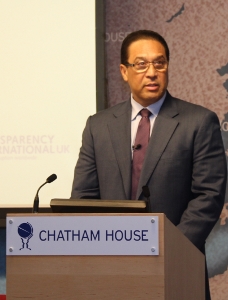
BBC and Chatham House cost public purse over $17k
 (CNS): The premier’s trip to London earlier this year to appear on the BBC’s leading news interview programme, to speak at the Chatham House conference and to meet FCO officials cost the public purse $17,437.70. Alden McLaughlin was joined on the week-long trip by Cabinet Secretary Samuel Rose and his senior political advisor, Roy Tatum. Officials from the premier’s office revealed Wednesday that the airfares totalled $8,048.59, the per diem allowances came to $3,300 and hotel expenses were $6,089.11.
(CNS): The premier’s trip to London earlier this year to appear on the BBC’s leading news interview programme, to speak at the Chatham House conference and to meet FCO officials cost the public purse $17,437.70. Alden McLaughlin was joined on the week-long trip by Cabinet Secretary Samuel Rose and his senior political advisor, Roy Tatum. Officials from the premier’s office revealed Wednesday that the airfares totalled $8,048.59, the per diem allowances came to $3,300 and hotel expenses were $6,089.11.
“This Chatham House conference examined the prospects for concerted action to tackle global corruption and considered the role of governments and businesses in achieving lasting impact,” the premier’s press secretary stated in a release. “Participants and speakers critically assessed current and emerging international efforts and considered their consequences for future business practice and governance.
“On HardTalk, the Hon. Premier shared Cayman’s positive story of being a successful Overseas Territory by answering hard hitting questions from presenter Stephen Sackur,” she added.
Although there had been concerns that Sackur would use the opportunity to undermine Cayman, the premier came away without too many licks.
While the appearance may have done little to change opinions on the global stage about offshore tax avoidance, fears that the appearance could make matters worse were unrealized and the premier was able to demonstrate that Cayman is willing to answer questions about the offshore sector after many years of turning away from the international media arena.
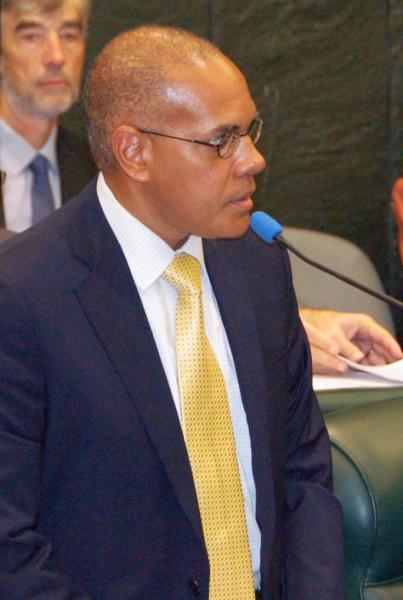
Archer still keen on SMCs
 (CNS): Despite the government’s narrow rejection of a motion in the Legislative Assembly last month calling for the introduction of 'one man, one vote' in single member constituencies (SMCs), at least one Cabinet member still appears to be very much in favour of it. A closer inspection of the Marco Archer’s speech in the LA during the debate on Arden McLean’s motion indicates that he will still be backing the original proposal of OMOV in 18 SMCs as per the referendum in 2012, for which he vigorously campaigned. The debate saw two of government’s own backbenchers rebel and three Cabinet members miss the vote, including Archer, but as government begins a controversial review of another type of voting, it may not have thesupport of its finance minister.
(CNS): Despite the government’s narrow rejection of a motion in the Legislative Assembly last month calling for the introduction of 'one man, one vote' in single member constituencies (SMCs), at least one Cabinet member still appears to be very much in favour of it. A closer inspection of the Marco Archer’s speech in the LA during the debate on Arden McLean’s motion indicates that he will still be backing the original proposal of OMOV in 18 SMCs as per the referendum in 2012, for which he vigorously campaigned. The debate saw two of government’s own backbenchers rebel and three Cabinet members miss the vote, including Archer, but as government begins a controversial review of another type of voting, it may not have thesupport of its finance minister.
Despite stating that he may have been wrong about multi-member constituencies, allowing representatives to escape blame or pass blame, Archer made it clear that he was still a stalwart supporter of the system of OMOV in single member constituencies.
He made little comment on the idea of 'at large' candidates or the size of constituencies throwing up anomalies and “bizarre results”, as was suggested by Premier Alden McLaughlin when the government leader made his first unexpected comments regarding government’s U-turn on the idea of the issue of 18 single member constituencies.
One of the Cabinet members absent from the vote, as he stated he was attending his child’s school reporting session, had Archer been present for the vote he would have been required to vote with the government or stand to lose his post as the finance minister.
East End MLA Arden McLean and Opposition Leader McKeeva Bush had challenged the premier to allow the government members to vote on their conscience because the issue was not a government motion dependent on Cabinet collective responsibility but a private members debate. However, it was apparent that the premier did not accept that challenge. His PPM team and his coalition members, whom he has claimed were behind the U-turn, were all required to reject the motion.
Clearly uncomfortable during the debate with the new direction on this now controversial issue, Archer said in his speech that no one could know how many of the 65% of voters who voted for the referendum in July 2012 were making an anti-government statement or were genuinely calling for 'one man, one vote'. However, the government member made a subtle declaration that he still believed in the ideal as he trod a political tightrope.
“We may never know how much of the OMOV and SMC campaign’s success should really be attributed to the ideal and how much it was a vote against the government of the day,” he said. “The referendum was intended to implement 'one man, one vote' in single member constituencies for the May 2013 election. Having failed to achieve that, it was always intended that it would be implemented with effect for the 2017 general elections. Eight months in office and three years remaining, I cannot afford any distractions, but I remain committed to its implementation for the 2017 General Election.”
Despite his support for OMOV and that of his back bench colleagues Al Suckoo and Anthony Eden, who took their chances and voted in line with their genuine beliefs and supported McLean’s motion, at least one front bencher is in support of the original ideal. However it may not be enough.
As government now begins another review of the political landscape requiring a new boundary commission to explore the concept of ‘at large’ national candidates, along with a reduced number of constituencies, a lack of political agreement in government saw the premier make it clear that he would not implement voting change without the full support of all of his government.
Despite the three years until the next election, it is looking increasingly unlikely, despite election promises, that Cayman voters will have equality of franchise in May 2017.
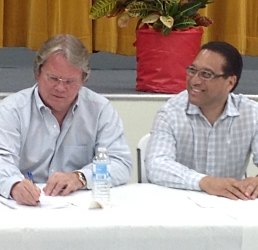
Range of new government jobs on Cayman Brac
 (CNS): Funding has been approved for the Police Marine Unit to have a dedicated patrol vesselon Cayman Brac, the premier announced at a meeting on the island Thursday night. Addressing around 300 Brackers at the civic centre on his first official visit to the Sister Islands as premier, Alden McLaughlin said that this would help improve security for the island and boost employment. He also announced that one of the outcomes following a review of the Cayman Islands Fire Service has been the approval of funding for 26 new officers, including six on Cayman Brac.
(CNS): Funding has been approved for the Police Marine Unit to have a dedicated patrol vesselon Cayman Brac, the premier announced at a meeting on the island Thursday night. Addressing around 300 Brackers at the civic centre on his first official visit to the Sister Islands as premier, Alden McLaughlin said that this would help improve security for the island and boost employment. He also announced that one of the outcomes following a review of the Cayman Islands Fire Service has been the approval of funding for 26 new officers, including six on Cayman Brac.
Deputy Premier Moses Kirkconnell, who co-hosted the meeting, announced a number of new government jobs on the island that have either been filled or will be in the near future. These included a plumber, a mechanic, a heavy equipment operator, two customs officers, two immigration posts, a road supervisor / asphalt plant operator, a labourer and an electrician.
Referring to coastal works applications for three marinas, he said that one, the Dilbert Marina next to the Alexander Hotel, which appeared to have large support from the 300 Brackers at the meeting, is complete and will be presented to caucus on Monday. The other two are with the Department of Environment, Kirkconnell said, and even though he admitted that he hadn’t looked at the environmental assessmentof the Dilbert Marine by the DoE, he said supported all three applications.
The government has just finished negotiations for 12 ships from the US Coast Guard to spend time in the Cayman Islands for “R and R” and two of those ships will come to Cayman Brac, Kirkconnell said. The ships will be here for four to five days and 120 sailors will come ashore with money to spend, he noted, adding, “We know how to welcome seamen.”
The Department of Tourism will be holding a “global meeting” on Cayman Brac on 23 March, in which 40 DoT representatives from Canada, Europe, the UK, and Western and Central US will be on the island for four days, having local interaction and taking tours, which the deputy premier described as very good exposure.
The PPM’s vision for the multi-purpose building on the Bluff, which was begun under the last government as a hurricane shelter and became known as the “Hurricane Hilton” because of the plans to have private rooms within the shelter, is to turn that into a school. Kirkconnell said that the Framework for Fiscal Responsibility demands that they complete a business case for that. However, since this cannot be completed in time for the next budget, they have decided to put that money into the roads project instead for this year but next year they will allot $500,000 to move this project forward and work with the education department regarding how to actually put in the classrooms to meet international best practices.
The road programme, he said, will continue up Peter’s Cave road and then go all the way down to the west end, in order to reach the maximum number of people.
Divestment a matter for CIG
(CNS):The overseas territories director has said that it is up to the Cayman Islands government to decide what it can privatize and it will need to make a decision about what services can best be delivered in the public sector and which can be divested to make deeper cuts in public spending. The senior FCO civil servant, who has responsibility for the overseas territories, said that while the local government’s fiscal position continues to show signs of improvement, the government has to stay on track to meet the fiscal trajectory. The current financial situation also means that the private sector will in the future have to do more of the work that government currently does.
“A constrained fiscal environment means that the private sector will have to do more of the work that government has done in the past,” Dr Peter Hayes told CNS during his brief visit to Cayman this week. “In line with the White Paper, the UK Government remains committed to providing technical support as may be necessary to help Cayman reform its public sector and deliver on its infrastructure investment programme.”
He said that the UK would not be directing the Cayman government to sell this authority or privatize that service. The OT boss said it was up to government to make those decisions but some soul searching was needed about what could be divested. But, as with many other places, cuts had to be made in public expenditure.
Hayes said this issue was on the agenda during his visit and it was clear there would be areas that would not necessarily suit divestment but there were ones that would. He said the UK would assist the CIG where necessary to help make the decisions and with the process. Hayes said the FCO would help to share best practice during the decision process as well as during the divestment but in the end decisions would need to be made.
He said there is sometimes an assumption that what government does is somehow free. It isn’t, he noted, and if government can’t afford to deliver the services that are needed the private sector had to fill the gaps and it would be a question of finding out which services can be delivered more efficiently by the private sector.
During his brief visit to Cayman Hayes also received a plaque with the Cayman Islands crest from Premier Alden McLaughlin. Included in the packed agenda was a visit to the Mission House, a National Trust Historic Site.
A reception was also held for Hayes at Grand Old House during the visit, which was to follow up on discussions between the premier and the FCO during his London visit last month.

‘FFR is not a constraint’
 (CNS): The overseas territories director has said that the Framework for Fiscal Responsibility is not a stumbling block to the resolution of the George Town landfill but by following the process the government is more likely to get the solution right and provide value for money. During his two day visit to Cayman this week Dr Peter Hayes from the Foreign and commonwealth Office told CNS that the UK can and will supply the technical assistance necessary to help deal with the issue but he said the problem of decades of mismanagement could not be resolved overnight, and given the fact that the Cayman Islands public will pay in the end, government had to ensure it got things right.
(CNS): The overseas territories director has said that the Framework for Fiscal Responsibility is not a stumbling block to the resolution of the George Town landfill but by following the process the government is more likely to get the solution right and provide value for money. During his two day visit to Cayman this week Dr Peter Hayes from the Foreign and commonwealth Office told CNS that the UK can and will supply the technical assistance necessary to help deal with the issue but he said the problem of decades of mismanagement could not be resolved overnight, and given the fact that the Cayman Islands public will pay in the end, government had to ensure it got things right.
The environmental health minister has stated that he anticipates it will be two years before government has a full workable solution in place as a result of the need to follow the process set out in the FFR agreement with the UK, which is now part of the local Public Management and Finance Law, a timeframe that the public is struggling to accept.
However, Hayes indicated clearly that the process could not be circumvented and that it would cost the tax payer much more in the end if government got it wrong by not setting out the policy, the business case and then setting about with an open and transparent procurement process.
“I would not say that the FFR is a constraint,” he said. “But with any significant amount of expenditure the government has to get it right now or pay for that later. The CIG needs to make sure it gets the best deal for the Cayman people or it will cost far more in the long run. “
He said that if nothing else the public was much more aware about waste-management, and with the country talking about the issue, it presented an opportunity for everyone to reconsider how much waste they generate and methods of mitigation and minimizing the waste going to the landfill through community initiatives. As an example, he spoke about glass crushing in BVI, which is now using its crushed glass as fill.
Although attempts were made in Cayman several years ago in the private sector, the lack of support from government and developers for that saw the efforts disappear. While some bars still have glass crushers purchased at the time, the crushed glass is still ending up in the landfill and not being utilized as fill by any developers, who are continuing to quarry and dredge instead.
Nevertheless, Hayes said Cayman was presented with an opportunity to think about how it wants to deal with waste management and reduction, recycling and reuse.
While some believe that the timeframe to get to the solution is too long because so much research and analysis on the potential solutions have already been done, others have raised concerns that because there is no current waste-management policy in place, the government is a long way from actually being able to produce a business case on how it wants to deal with "Mount Trashmore".

Alden to escape political pressure on Sister Islands
 (CNS): As things heat up for the premier on Grand Cayman, Alden McLaughlin will be taking a short trip to the Sister Islands at the end of this week, where he can take a break from the pressure over his u-turn on the election commitment of introducing 'one man, one vote' and single member constituencies. Facing considerable controversy here after Friday’s near loss for government on the OMOV motion and taking flak over minimum wage, the support for a road through the Mastic Trail and a potential serious split in his government, officials said McLaughlin will lead a government delegation to Cayman Brac and Little Cayman on Thursday for a two-day tour with a full agenda.
(CNS): As things heat up for the premier on Grand Cayman, Alden McLaughlin will be taking a short trip to the Sister Islands at the end of this week, where he can take a break from the pressure over his u-turn on the election commitment of introducing 'one man, one vote' and single member constituencies. Facing considerable controversy here after Friday’s near loss for government on the OMOV motion and taking flak over minimum wage, the support for a road through the Mastic Trail and a potential serious split in his government, officials said McLaughlin will lead a government delegation to Cayman Brac and Little Cayman on Thursday for a two-day tour with a full agenda.
A reception and public meeting will also be held at 6:15pm on Thursday at the Aston Rutty Centre.
“I am looking forward to spending some time with our residents on Cayman Brac and Little Cayman,” said McLaughlin. “We have a full agenda with several meetings and I welcome this opportunity to talk with people about the issues they face on our other two islands,” he added.
He will be met on Cayman Brac by Deputy Premier Moses Kirkconnell and District Commissioner Ernie Scott. From there they travel to Little Cayman for a tour and meetings with the Royal Cayman Islands Police Service, Fire Service and a discussion. On Thursday afternoon the premier returns to Cayman Brac, where he will meet with the Fire Service and workers at the Public Works Compound. A reception and public meeting will be held at 6:15pm at the Aston Rutty Centre.
Friday morning the premier will tour Cayman Brac Police Station followed by a meeting with the RCIPS. In the afternoon McLaughlin meets with staff at the District Administration Building, Heads of Sections and Social Services. He will also tour the Kirkconnell Community Care Centre and meet with Scott.
Travelling with the premier, who returns to Grand Cayman Saturday, will be his senior political advisor Roy Tatum, the press secretary Tammie Chisholm, the community affairs chief officer Dorine Whittaker, and the home affairs chief officer Eric Bush, as well as the district administration chief officer Stran Bodden.

Beneficial ownership register would ‘cripple’ markets
(CNS Business): The Cayman Islands Law Society (CILS) has saidthat the mechanism by which beneficial ownership information can already be obtained is sufficient and there is “absolutely no need to jeopardise the privacy of legitimate business” by allowing full public access to confidential information with a publicly accessible register. In its submission to the Financial Services Ministry regarding the consultation paper on the issue, the Law Society presented a raft of arguments against the register, including costs, which would “cripple all financial markets (onshore and offshore)”. All points made by the CILS were endorsed by the Chamber of Commerce in its own submission to the ministry, which urged government "to oppose vigorously any attempt to introduce a public register of beneficial ownership information." Read more on CNS Business
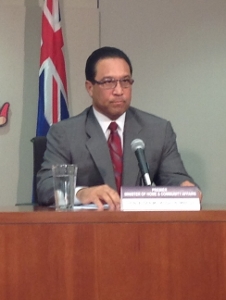
No OMOV without consensus
 (CNS): The chances that the country’s voting system will be changed before 2017 now look very slim after the premier revealed on Monday that he will not push through a change without full consensus. Alden McLaughlin wouldn’t reveal how many members of his government were opposed to implementing the system based on the 2012 referendum of 18 SMCs or who they were but pointed the finger at those who did not run on the PPM ticket. In the face of allegations from Arden McLean and other sources that it is McLaughlin himself who is the most reluctant to move on the changes, the premier said McLean’s motion was about trying to bring down his government and not the voting system.
(CNS): The chances that the country’s voting system will be changed before 2017 now look very slim after the premier revealed on Monday that he will not push through a change without full consensus. Alden McLaughlin wouldn’t reveal how many members of his government were opposed to implementing the system based on the 2012 referendum of 18 SMCs or who they were but pointed the finger at those who did not run on the PPM ticket. In the face of allegations from Arden McLean and other sources that it is McLaughlin himself who is the most reluctant to move on the changes, the premier said McLean’s motion was about trying to bring down his government and not the voting system.
Speaking at a press briefing Monday held to discuss an MOU signed with the proposed Ironwood project developers, the premier said that the events on Friday were not “government’s finest hour” but that merely reflected how controversial this issue is.
Referring to the situation when the House was tied over the vote on McLean’s motion on OMOV in SMCs because PPM back-benchers Anthony Eden and Al Suckoo voted for it and three Cabinet ministers were absent, as well as the opposition leader, at the time of the vote, he pointed to mistakes made by what he said were novice parliamentarians in the face of a seasoned legislator who knew to round up his speech with haste when he saw the empty seats.
He said he believed that the retreat had led to a compromise on the issue that everyone in his government could support but that turned out not to be the case.
McLaughlin pointed to a lack of support by some government members for the 18 SMCs, his own concerns about small constituencies and his preference for 'at large' candidates and fewer constituencies, andas a result there would be no change to the electoral system unless it included 'at large' candidates.
With the split on the issue inside the PPM as well as the wider government and the need for a new boundary commission to examine and draw up the suggested 15 constituencies, the time to conduct that process and then implement the change means that time could very easily run out before 2017. McLaughlin stated clearly that the voting system would not change unless it had the support of all his government members and he would not try to force anything through that the government members did not all agree on.
Despite the U-turn on the election promise and allegations that he had wavered, McLaughlin seemed undeterred as he said keeping his government together to address the pressing issues of the day was more important. The premier stated that it was not just one or two members that were not in favour of the 18 SMCS, and though they were all committed to the issue of voter equality, many government members still have concerns about the potential problems that could be thrown up by too small constituencies, he said.
Pointing to his belief that it would be easy for people to get elected on just 250 votes in constituencies that would be made up of about 1000 members, he spoke again of “bizarre results” especially in vulnerable areas of the capital where voters are at the bottom of the socio-economic scale. He also stated that the introduction of ‘at large’ candidates, those who would run on a national ticket, would “mitigate against” what he described as “parochial politics”.
McLaughlin also dismissed the allegations made by East End member Arden McLean, who brought the motion, that he had tried to cut a deal with him. McLaughlin said McLean had left the PPM because of the leadership and not because of the issue of SMCs.
The premier said that “there was nothing to be gained” by him answering the allegations which were “coloured by his perceptions” about what had happened. He made it clear that he believed that the motion was brought deliberately to undermine government and described it as a “frontal assault” in his and Ezzard Miller’s efforts to bring down the administration “having identified an Achilles heel” in what was an otherwise a solid, unified administration.
The premier said his government was not in general divided and he did not believe any of his team were planning to join the opposition benches but this was an issue which was going to be difficult.
“Government took a beating … but we have a country to run,” he said, adding that he did not think the voting system was at the forefront of many people’s minds.
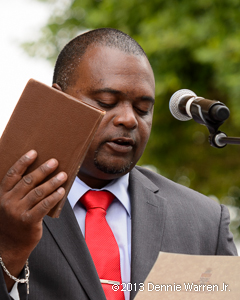
Suckoo: $5 wage too low
 (CNS): Following his decision to vote in favour of the private member’s motion on 'one man, one vote' (OMOV) in the Legislative Assembly Friday evening, Alva Suckoo has also revealed that the only reason why he voted against the motion regarding minimum wage was because he believed $5 is too low even as a starting point. The Bodden Town backbencher said that he supports the minister’s decision to do the research in order to arrive at rate which will make a difference and end the exploitation of cheap labour but he believes that the research should only take weeks, not months, as he called for a speedy implementation.
(CNS): Following his decision to vote in favour of the private member’s motion on 'one man, one vote' (OMOV) in the Legislative Assembly Friday evening, Alva Suckoo has also revealed that the only reason why he voted against the motion regarding minimum wage was because he believed $5 is too low even as a starting point. The Bodden Town backbencher said that he supports the minister’s decision to do the research in order to arrive at rate which will make a difference and end the exploitation of cheap labour but he believes that the research should only take weeks, not months, as he called for a speedy implementation.
Suckoo told CNS that he had intended to speak on the issue during the debate on the private member’s motion presented by North Side MLA Ezzard Miller last week, which asked government to implement a minimum wage starting at $5 per hour. However, Suckoo said he missed the speaker’s last call.
No other member spoke on the issue of a minimum wage last week following the employment minister’s damning criticisms of Miller’s motion and her indication that government would be engaging in considerable research and analysis before it would be considering any basic rate. Although the PPM campaigned in favour of a minimum wage and its implementation as an early priority, Tara Rivers, who was backed by the Coalition for Cayman, is understood to be opposed in principle.
Suckoo said, however, that he does believe Cayman needs to introduce a minimum wage as soon as possible. Although he could not agree with the amount recommended in the motion, he said the time had come for its implementation.
Cheap labour began replacing Caymanian school leavers when the recession kicked in, resulting in high Caymanian unemployment, he said.
“Caymanian students are leaving high school with no prospects for employment,” he noted. “The previous government had a policy of simply approving work permits and the NWDA received no attention and became dysfunctional.”
He pointed to people living in sub-standard overcrowded housing as a result of the importation of cheap foreign labour and said that the authorities had ignored the social problems this has created. As the son of an immigrant, he said, he also had an interest in seeing that foreign workers are also treated fairly.
“Unethical and unscrupulous behaviour and what I consider corrupt practices have made Caymanians second-class citizens in our own country,” the backbencher said. “In a country with 20,000 work permits and more jobs than the local work force, there is no excuse anyone can offer for the level of unemployment we are witnessing. It has become systemic.”
Suckoo said that a minimum wage would not, as some believe, be inflationary but he said it would achieve a fair, effective and balanced relationship between local and expatriate labour. Hourly rates for some jobs have not moved in decades, despite increases in the cost of living, so anyone who opposes the notion of employee protection is “either blind to the facts or deliberately ignoring them,” he added.
“The argument that a minimum wage would put unskilled labourers out of work began to unravel in the 1990’s,” he told CNS. “Studies conducted during that period proved that all things being equal, small increases in minimum wage had no significant impact on employment in the low-skilled population.
“As lawmakers, it is our duty to ensure that we set the line below which wages must not fall,” Suckoo said, adding that the government and MLAs needed to demonstrate that they subscribe to a higher moral and ethical standard than those who allow the exploitation of workers within their industries.
But with arguments that the wage should be now to set at $5, $7, $8 or even $10 was an indication, Suckoo observed, that the government doesn’t yet have the necessary data and research to make an informed decision. He said he supported the decision to conduct the research but he hoped to see the work completed sooner rather than later so that it would be brought to the LA as quickly as possible for passage.
“I haven’t forgotten that a minimum wage was a promise I made on the campaign trail and I remain committed to seeing this done,” he said, but noted that the exercise required precision.
The motion brought by Miller had requested government change the labour law to implement a $5 rate as a minimum wage as a starting point, which could be reviewed. But if the country didn’t begin somewhere, it would continue arguing about it for another twenty years, he said.
See related stories on CNS:
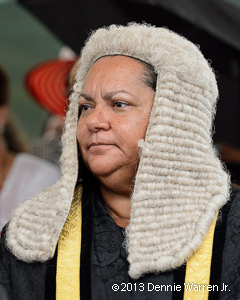
Speaker breaks motion tie
 (CNS): Al Suckoo’s surprise last minute support, as well as backing from Anthony Eden and two opposition members and the absence of four Cabinet ministers, almost saw Arden McLean and Ezzard Miller win the day on the East End member’s private motion on 'one man, one vote' (OMOV) in single member constituencies (SMCs). With 6 ‘no’ votes from the government benches, 6 yes votes from both sides, the five absentees forced the speaker to use her casting vote in accordance with standing orders and the constitution. A long opponent of SMCs, however, it was no surprise that Juliana O’Connor-Connolly defeated the motion witha 'no' vote but the debate stirred up passions and revelations as well as some uncomfortable moments for the premier long before it came down to the wire.
(CNS): Al Suckoo’s surprise last minute support, as well as backing from Anthony Eden and two opposition members and the absence of four Cabinet ministers, almost saw Arden McLean and Ezzard Miller win the day on the East End member’s private motion on 'one man, one vote' (OMOV) in single member constituencies (SMCs). With 6 ‘no’ votes from the government benches, 6 yes votes from both sides, the five absentees forced the speaker to use her casting vote in accordance with standing orders and the constitution. A long opponent of SMCs, however, it was no surprise that Juliana O’Connor-Connolly defeated the motion witha 'no' vote but the debate stirred up passions and revelations as well as some uncomfortable moments for the premier long before it came down to the wire.
During his closing remarks on what had been a long debate, in which some members of government had clearly been troubled over the motion, Arden McLean took aim at his former party colleague, Premier Alden McLaughlin, and said he had never supported single member constituencies and never would. He said he had remained silent for too long but then pointed the finger at the PPM leader as the stumbling block to the more equitable voting system.
In an impassioned response to the two-day debate on his motion, the member for East End said that the premier, when he was leader of the opposition, had tried to cut a deal with him over the plan for a referendum on the issue of 'one man, one vote' and single member constituencies. He revealed that McLaughlin had offered to support the referendum plans only if McLean in turn supported the three additional members.
However, the East End member had consistently opposed the growth of parliament because he said the country could not afford it and refused the deal So he went his own way with Miller, the independent member for North Side, who was equally as committed to OMOV and SMCs
McLean said the disagreement over SMCs was the straw which broke the camel’s back form him in terms of his eventual departure from the Progressives. He warned the new members on the government benches that their leader was never going to put SMCs in place and this was their chance to see it happen, and if they did not take the chance, the people would remember.
Al Suckoo, who had been a staunch advocate and a key player in the 2012 OMOV campaign, was in the end the only member who took heed. His own contribution to the debate on Thursday had seen him commit to SMCs and although he had noted that there may be some questions still to be asked about the future voting system, the young Bodden Town representative had not stated in the debate whether he would or would not be backing the motion.
In the end, Suckoo rose above party politics and voted with his conscience rather than the party line, a brave move for the novice backbencher but one likely to pay off in the future. His senior Bodden Town parliamentary colleague, Anthony Eden, also stuck to his guns and, as promised, voted in favour of the motion.
However, it was the mysterious absence of four Cabinet members – Tara Rivers,Wayne Panton, Marco Archer and Osbourne Bodden – which was even more significant. It was clear during the debate yesterday that Archer and Panton were finding the situation uncomfortable. However, Archer later told CNS that he was attending a reporting session at his daughter's primary school, which was why he missed the vote.
Rivers made just a short contribution and Bodden made sure he wasn’t involved in the debate at all, as it is understood he went on personal leave. Given that critical front bench absence, the support from both Bernie Bush and Captain Eugene Ebanks on the opposition benches, as well McLean and the seconder of the motion, Ezzard Miller, very nearly carried the day.
Having cleared his team to vote their conscience, Opposition Leader McKeeva Bush was also absent from the chamber at the time of the vote. Bush has always opposed to SMCs but it was clear he saw the political capital in not adding to the 'no' votes.
During his closing remarks McLean reached fever pitch in his condemnation of the premier, not least in reference to the premier’s comments about demographics. Urging everyone to stop the racial divisions among Caymanians, he pointed out that the only people who can vote are Caymanian. He said it did not matter if they were white, green yellow or black, it was Caymanians in total that politicians had to worry about, not any demographics, as he turned to the speakerand asked her to put his motion to the vote.
Vote in the CNS online poll:
Were the PPM wrong to u-turn on 'one man, one vote' in single member constituencies?